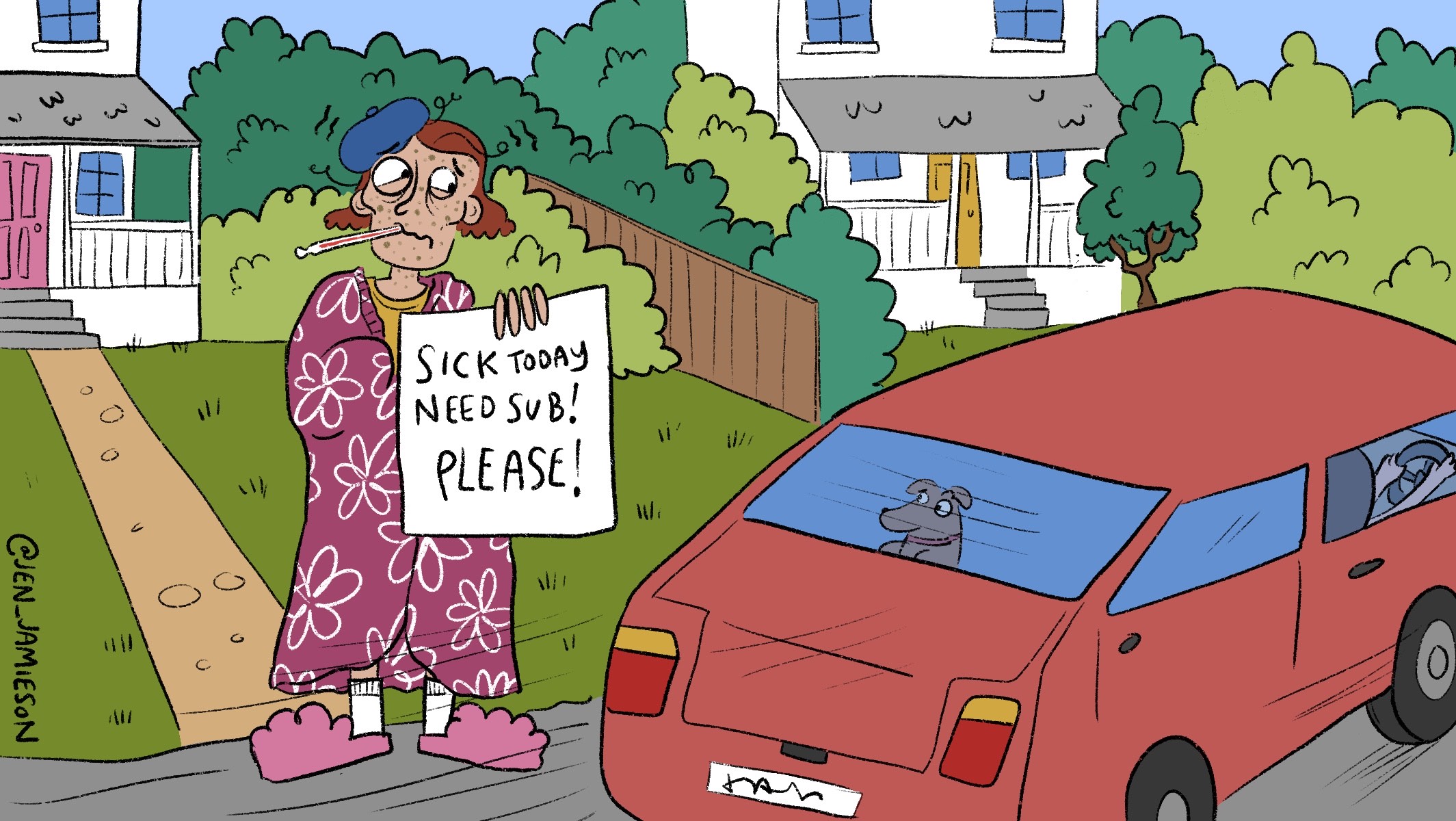
Dear We Are Teachers,
My principal explained during in-service that we have a new policy for teachers to follow when they’re absent, and it is garbage. First, we have to email our principal and team (that’s normal). Then, we have to log in to our sub system and create an absence (also normal). Then, we are expected to PERSONALLY CONTACT substitutes BY PHONE until we find one who can confirm that they will take the substitute job. When someone in the meeting asked, “What if we can’t find anyone to take it?” my principal said, “Keep calling until you find someone.” I’m not afraid of telling my principal what I think, but I wondered if you could coach me on an approach.
—So Outraged I’m Typing in All Caps
Dear S.O.I.T.I.A.C.,
We had a similar policy at my last school. At least a couple of weekday mornings each school year, I’d wake up very sick. And instead of firing off a quick email from my phone and resting, calling a doctor, or taking care of myself, I’d have to drag out my laptop and start on the 6-step process of finding a sub. (Particularly fun if one of your symptoms is brain fog, BTW.)
All that to say: I’m with you on this. It’s a garbage policy. I understand that not securing a sub puts an additional strain on teammates who have to provide coverage. I understand we have sub shortages. And I understand that everyone who works in a school is already overworked. But are we honestly saying that in 2024, we have no better system in place when teachers wake up sick … than to make them do additional work?!
Whew. Let me change gears.
Here’s the approach I’d recommend with your principal:
Start with respect and common ground.
Explain that you understand the reasons behind the policy. Offer, too, that it matters to you to follow policy and be a team player.
Phrase your complaints as questions.
Instead of “It’s messed up that you said if a teacher can’t get a sub they have to keep calling ad infinitum,” say, “I have some questions about the policy I wanted to go over with you. If I can’t reach a sub, at what point is it OK to rest and take care of myself?”
Come with suggestions.
Maybe the school can set up a robocall with the phone numbers of reliable subs. Maybe PTA can put together a rotation of parents willing to call subs for teachers (or even get trained to sub themselves!). The more suggestions you can come with, the less you’ll sound like you’re just complaining (even if it’s valid).
Dear We Are Teachers,
School started a month ago, and I’m afraid I started off way too lenient with my 6th graders. (In my defense, I’d been teaching 10th grade for four years and didn’t want to come off too mean!) They’re practically feral now and I’m kind of afraid of them.
What can I do to right this ship? Or is it too late?
—Save Me
Dear S.M.,
It’s OK. We’ve all underestimated 6th graders before.
There’s plenty you can do to turn things around—some as soon as tomorrow!
Check out these teacher-tested quick fixes for out-of-control classes.
These classroom management resets and quick fixes are small lifts but have big gains. (How’d you like that sports language?)
For improvement that takes a little more time and muscle, read up on these approaches for the long game.
This list has my top behavior management recs, from professional development ideas to mindset shifts.
It’s never too late to do a total reboot.
Need to start from scratch? Reteach routines and procedures as a mini lesson each day for two weeks. For 6th graders, I’d definitely make sure to have them practice entering the classroom quietly, managing voice levels, and transitions between activities using a timer.
Best of luck!
Dear We Are Teachers,
I’m in my first year of teaching 9th grade English. My AP did my first 10-minute walk-through observation. To my surprise, I got feedback during our walk-through meeting that I shouldn’t be “teaching out of the textbook.” When I apologized and said I didn’t know we couldn’t use them, he said, “It’s no problem to use them; it’s a problem to rely on them.” I’m so confused. While the AP was there, we were reading “An Occurrence at Owl Creek Bridge” out loud. I stopped on occasion to switch reader volunteers, highlight new vocabulary, or provide a visual on the Smartsboard with slides I’d prepared. Everyone was engaged. I’m so confused!
—When Did We Start Hating Textbooks?
Dear W.D.W.S.H.T.,
I’ve wondered this, too, in recent years. In the past, textbooks were pretty dry. But now, there are some truly great ones out there that point out fabulous in-text connections, offer great questions for discussions and analysis, and even connect to other subjects or historical events. “Teaching from the textbook” has become such a taboo phrase that I think some appraisers gasp when textbooks are open at all without taking the time to think critically about how they’re being used.
You sound like you were using a textbook as a basis for great teaching, not a replacement. I would talk to your department chair about the discrepancy—they’re the perfect liaison between leadership and your content area. They can help you with your next conversation with your administrator, and maybe even a “Textbooks: Evil or Helpful?” info session for appraisers at your school.
Do you have a burning question? Email us at askweareteachers@weareteachers.com.
Dear We Are Teachers,
A teacher friend of mine at another school in our district got in trouble for posting her Amazon wish list for school on Facebook. Her principal said that any crowdfunding needs to be processed by the district as fundraising, but the red tape to do that is so time-intensive and tedious. I was definitely banking on being able to make an Amazon wish list this year for friends and family, but I don’t want to get in trouble. Is there some kind of loophole?
—Nothing Without You

